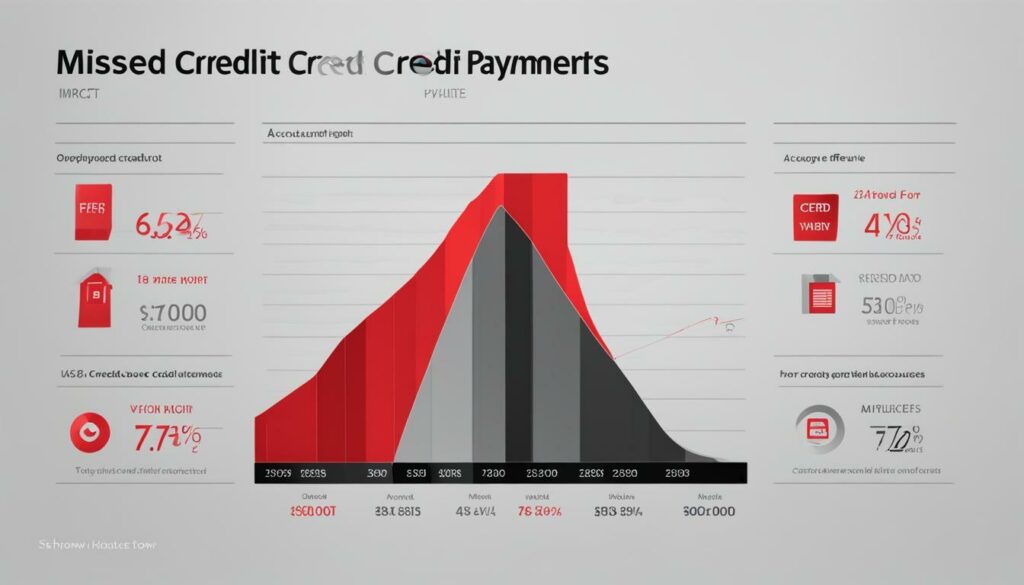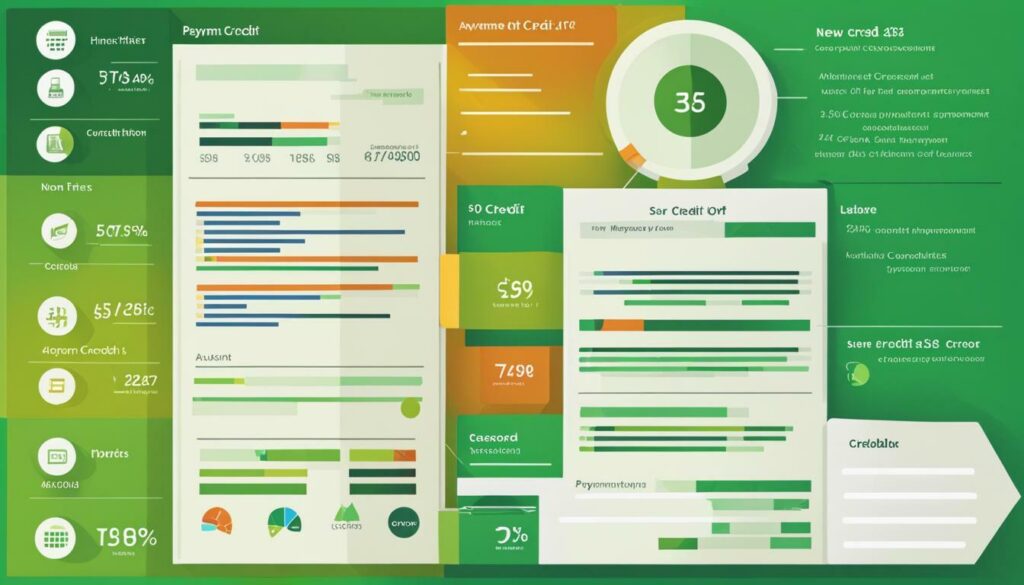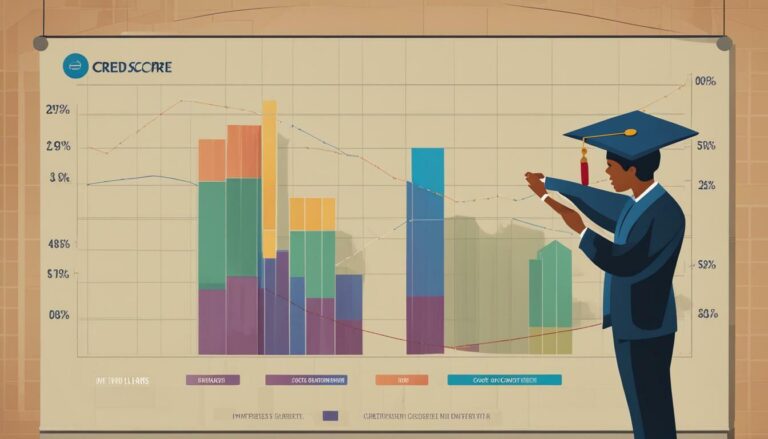Understanding the Factors That Can Lower a Credit Score: Crucial Insights

Managing your credit score requires a deep understanding of the factors that can lower it, as these factors play a crucial role in determining your creditworthiness. By familiarizing yourself with these factors, you can make informed financial decisions and take proactive steps to protect and improve your credit health.
- Payment history and credit utilization are two of the most significant factors that impact credit scores.
- Paying bills on time, avoiding late payments, and minimizing accounts sent to collections are essential for maintaining a positive payment history.
- Keeping credit utilization below 30% is recommended to maintain a healthy credit score.
- Other factors that affect credit scores include the length of credit history, the types of credit used, and recent credit activity.
- Maintaining a positive payment history, managing credit utilization, and being mindful of other credit score factors can help improve your creditworthiness over time.
The Impact of Payment History on Your Credit Score
Your payment history is one of the most significant factors that affect your credit score, with late payments and collections having a negative impact on your creditworthiness. When lenders review your credit report, they want to see a track record of responsible repayment. A payment history that includes missed payments or accounts that have been sent to collections can signal to lenders that you may be a higher credit risk.
According to the FICO credit scoring model, payment history accounts for 35-40% of your credit score. This means that consistently making on-time payments is essential to maintaining a healthy credit score. Late payments, even by just a few days, can lower your score and stay on your credit report for up to seven years.
In addition to late payments, collections can also significantly impact your credit score. When an account is sent to collections, it means that the original creditor has given up on receiving payment and has enlisted the help of a collection agency to recover the debt. Having accounts in collections on your credit report can lower your credit score and make it more challenging to access credit in the future.
“Your payment history is the foundation of your credit score. Consistently making on-time payments is crucial for maintaining a positive credit history and improving your creditworthiness.”
Understanding the Factors That Can Lower a Credit Score
It’s important to recognize that late payments and collections are just a few examples of how payment history can impact your credit score. Other factors, such as the number of late payments, the severity of the delinquencies, and the time since the missed payments, can also influence your score. By understanding the factors that negatively impact your credit score, you can take proactive steps to improve your payment history and overall creditworthiness.
🚨 TUIC Errors + Low Credit Score?
CreditScoreIQ helps you build credit faster by reporting utility bills to all 3 bureaus—while you dispute errors.
Start Building Credit Today →| Factors That Negatively Impact Credit Score |
|---|
| Late Payments |
| Accounts Sent to Collections |
| Number and Severity of Delinquencies |
| Time Since Missed Payments |
By consistently making on-time payments and working towards resolving any past delinquencies, you can improve your payment history over time. It’s essential to regularly review your credit report and address any inaccuracies or discrepancies that may be negatively affecting your score. Remember, a good payment history demonstrates your ability to responsibly manage credit and can ultimately help you achieve your financial goals.

Credit utilization, which refers to the amount of credit you use compared to your total credit limit, plays a significant role in determining your creditworthiness. It is a crucial factor that lenders consider when assessing your financial health. Maintaining a low credit utilization ratio demonstrates responsible credit management and can positively impact your credit score.
Experts recommend keeping your credit utilization below 30% to maintain a healthy credit score. For example, if you have a total credit limit of $10,000, it is advisable to keep your credit card balances below $3,000. This shows lenders that you are not relying heavily on credit and can effectively manage your debt.
To illustrate the importance of credit utilization, consider the following example:
| Credit Limit | Credit Card Balance | Credit Utilization Ratio |
|---|---|---|
| $10,000 | $2,500 | 25% |
In this example, the individual has a credit utilization ratio of 25%, which is well below the recommended threshold. This low ratio demonstrates responsible credit management, and lenders are more likely to view this individual as a reliable borrower.
Impact on Credit Scores
High credit utilization can have a negative impact on your credit score. When your credit card balances approach or exceed your credit limit, it can signal financial instability to lenders. This can result in a lower credit score, making it more challenging to access favorable interest rates or secure credit in the future.
It is important to note that credit utilization is reported to credit bureaus periodically, typically on your statement closing date. This means that even if you pay off your balances in full each month, if your utilization was high at the time of reporting, it can still have a temporary negative impact on your credit score. Therefore, it is advisable to monitor and manage your credit utilization regularly.

By understanding and actively managing your credit utilization, you can make significant strides towards improving your creditworthiness. This includes paying off debts, maintaining low credit card balances, and being mindful of your credit limits. Taking these steps will not only help boost your credit score but also increase your chances of obtaining favorable financial opportunities in the future.
The Role of Length of Credit History in Credit Scores
The length of your credit history is a crucial component of your credit score, and a longer credit history generally reflects a more reliable creditworthiness. Lenders and financial institutions use this information to assess your ability to manage credit responsibly and make informed decisions about extending credit to you. When evaluating your creditworthiness, they consider factors such as the age of your oldest account, the average age of your accounts, and the age of your newest account.
A longer credit history provides a more comprehensive picture of your financial behavior over time, allowing lenders to assess your creditworthiness more accurately. It demonstrates that you have a proven track record of managing credit responsibly and making timely payments. This can positively impact your credit score and increase your chances of obtaining favorable loan terms, such as lower interest rates or higher credit limits.
On the other hand, a shorter credit history may limit your credit score’s accuracy and lenders’ ability to evaluate your creditworthiness. However, if you are just starting to build credit, there are steps you can take to establish a positive credit history. One way is by opening a secured credit card or becoming an authorized user on someone else’s credit card. These responsible credit management practices can help you establish a solid credit history and improve your credit score over time.
It’s important to note that the length of credit history is just one factor that contributes to your overall credit score. While it plays a significant role, other factors like payment history, credit utilization, types of credit used, and recent credit activity also influence your creditworthiness. By actively managing these factors and maintaining positive financial habits, you can improve your credit score and establish a solid foundation for your financial health.
The Impact of Types of Credit Used on Credit Scores
The types of credit you have in your credit mix contribute to your credit score, emphasizing the importance of managing a diverse range of credit accounts. Credit bureaus assess the types of credit you use to determine your creditworthiness and evaluate your ability to handle different types of financial obligations.
A diverse credit mix typically includes a combination of installment loans, such as auto loans or mortgages, and revolving credit, such as credit cards or lines of credit. Having a variety of credit accounts in your credit history demonstrates your ability to manage different types of debt responsibly, which can positively impact your credit score.
On the other hand, relying heavily on one type of credit can negatively impact your creditworthiness. For example, if you have a disproportionate number of credit card accounts and minimal installment loans, lenders may view this as a potential risk. It is important to strike a balance between different types of credit to showcase your financial stability and responsible borrowing habits.
| Type of Credit | Impact on Credit Score |
|---|---|
| Revolving Credit (Credit Cards) | Affects credit utilization and payment history |
| Installment Loans (Mortgages, Auto Loans) | Contributes to credit mix and demonstrates responsible borrowing |
| Retail Accounts (Store Credit Cards) | Impact credit utilization and can help build credit if managed well |
| Finance Company Accounts | Considered higher risk due to potentially higher interest rates |
Managing your credit mix is an important aspect of maintaining a healthy credit score. By diversifying your credit accounts and using credit responsibly, you can improve your creditworthiness and increase your chances of qualifying for favorable lending terms in the future.

{{}}Additional Considerations{{}}
- It’s important to note that opening multiple credit accounts within a short period of time can have a negative impact on your credit score. Each new application for credit triggers a hard inquiry, which can lower your score temporarily.
- When considering new credit accounts, it’s essential to understand the terms and conditions, including interest rates and fees. High-interest rates or excessive fees can make credit accounts more costly and difficult to manage.
- If you have a limited credit history or are trying to establish credit, starting with a secured credit card or a small installment loan can be a good way to build credit. These types of credit can help demonstrate your ability to manage debt responsibly.
Recent Credit Activity and Its Influence on Credit Scores
Your recent credit activity can have a notable effect on your credit score, making it crucial to exercise caution when applying for new credit. Lenders consider recent credit applications as a potential risk factor, as it implies an increased possibility of taking on excessive debt or facing financial difficulties. It is advisable to avoid submitting multiple credit applications within a short period since each application typically triggers a hard inquiry, which can temporarily lower your credit score.
Additionally, managing new credit responsibly is vital. Opening too many new accounts in a short timeframe can signal to lenders that you are relying heavily on credit, which can negatively impact your creditworthiness. It is important to maintain a balanced approach to credit utilization and gradually establish a positive repayment history with any new accounts you open.
To illustrate further, consider the following table that outlines the potential impact of recent credit activity on credit scores:
| Recent Credit Activity | Credit Score Impact |
|---|---|
| Multiple credit applications and hard inquiries | Temporary decrease |
| Opening many new accounts in a short timeframe | Potential decrease |
| Managing new credit responsibly | Potential increase over time |
Remember, being mindful of recent credit activity is an essential part of maintaining a healthy credit score. By carefully managing your credit applications and responsibly handling new credit, you can ensure that your recent credit activity positively contributes to your overall creditworthiness.

- Recent credit activity can impact your credit score, so exercise caution when applying for new credit.
- Avoid submitting multiple credit applications within a short period to minimize the negative impact of hard inquiries.
- Manage new credit responsibly by maintaining a balanced approach to credit utilization and establishing a positive repayment history.
How to Improve Your Credit Score Over Time
Improving your credit score is possible with careful attention to your payment history, credit utilization, and other creditworthiness factors. These factors play a significant role in determining your creditworthiness and can have a substantial impact on your overall financial health. By understanding how these factors affect your credit score, you can take proactive steps to improve it. Here are some strategies to help you on your path to a better credit score:
- Pay your bills on time: Your payment history is a crucial factor in determining your credit score. Make sure to pay all your bills, including credit card payments and loan installments, on time. Late payments can have a negative impact and stay on your credit report for up to seven years.
- Keep credit utilization low: Credit utilization refers to the amount of credit you use compared to your total credit limit. To maintain a healthy credit score, it is advisable to keep your credit utilization below 30%. For example, if you have a credit card with a $10,000 limit, try to keep your balance below $3,000.
- Diversify your credit mix: Having a diverse mix of credit accounts, such as credit cards, mortgages, and personal loans, can positively impact your credit score. It demonstrates that you can manage different types of credit responsibly. However, avoid opening unnecessary accounts just for the sake of diversification.
- Avoid excessive credit applications: Applying for multiple credit accounts within a short period can be seen as a red flag by lenders and can negatively impact your credit score. Only apply for credit when necessary and be mindful of the potential impact on your creditworthiness.
By implementing these strategies, you can steadily improve your credit score over time. It is important to remember that improving your credit score is a gradual process. It requires consistency, discipline, and responsible financial management. Regularly monitor your credit report and stay informed about changes in the factors that affect your creditworthiness. With patience and diligence, you can achieve a better credit score and enjoy the benefits of improved financial health.

Understanding how credit scores are calculated offers valuable insight into the factors that influence your creditworthiness. By comprehending the components that contribute to your credit score, you can make informed decisions and take actions to improve your financial health.
Payment history and credit utilization are two crucial factors that determine your credit score. Payment history accounts for 35-40% of the score, encompassing aspects such as the timeliness of bill payments, the frequency of late payments, and any accounts that have been sent to collections. Demonstrating a consistent record of timely payments positively impacts your creditworthiness.
Credit utilization, which accounts for 20-30% of the score, refers to the amount of credit you use compared to your total credit limit. Keeping your credit utilization below 30% is recommended to maintain a healthy score. This means using a smaller portion of your available credit, which indicates responsible credit management and lower risk to lenders.

In addition to payment history and credit utilization, other factors can affect your credit score. The length of your credit history plays a role, as having a longer credit history demonstrates a track record of responsible credit usage. The types of credit you use, such as credit cards, loans, or mortgages, also impact your score. Maintaining a diverse credit mix can be beneficial. Recent credit activity, including the number of new credit applications and your management of new credit accounts, can influence your score as well.
Factors Affecting Credit Score
| Factors | Percentage Impact |
|---|---|
| Payment History | 35-40% |
| Credit Utilization | 20-30% |
| Length of Credit History | 15-20% |
| Types of Credit Used | 10-15% |
| Recent Credit Activity | 10-15% |
Improving your credit score requires a proactive approach. Maintaining a positive payment history, utilizing credit responsibly, and being mindful of the various factors that contribute to your creditworthiness are essential steps towards financial stability. By understanding credit score calculation, you have the knowledge to make informed decisions and improve your credit health over time.
The Components of a Credit Score: A Comprehensive Overview
A credit score consists of various components that reflect different aspects of your financial behavior and creditworthiness. Understanding these components is essential for managing your credit effectively and improving your overall credit score.
One of the main factors that determine your credit score is payment history. It accounts for 35-40% of your score and includes factors such as paying bills on time, the frequency of late payments, and any accounts that have been sent to collections. To maintain a good payment history, it is crucial to make all your payments on time and avoid delinquencies.
Credit utilization is another significant factor that affects your credit score. It accounts for 20-30% of your score and refers to the amount of credit you use compared to your total credit limit. It is recommended to keep your credit utilization below 30% to demonstrate responsible credit management.
Additionally, the length of your credit history, the types of credit you use, and recent credit activity also impact your credit score. Having a longer credit history, a diverse credit mix, and avoiding excessive credit applications can contribute positively to your creditworthiness. By being mindful of these factors and actively managing them, you can work towards improving your credit score over time.

Understanding the components of a credit score is crucial for maintaining good financial health and achieving your long-term financial goals. By consistently managing payment history, credit utilization, and other factors, you can take control of your credit and work towards a higher credit score.
Establishing a Path Towards Financial Health
Armed with a solid understanding of the factors that can lower your credit score, you can take proactive steps towards achieving financial health. By implementing the following strategies, you can improve your creditworthiness and increase your chances of securing favorable loan terms, better interest rates, and overall financial stability.
1. Maintain a Positive Payment History
Your payment history is one of the most significant factors that determine your credit score. To ensure a positive payment history, it’s crucial to pay your bills on time and in full. Late payments and accounts sent to collections can have a detrimental impact on your creditworthiness. Consider setting up automatic payments or alerts to stay on top of your bills and avoid any negative marks on your credit report. Remember that consistency is key when it comes to maintaining a positive payment history.
2. Keep Credit Utilization Low
Credit utilization refers to the amount of credit you are using compared to your total credit limit. To keep your credit utilization low, it is advisable to use no more than 30% of your available credit. For example, if you have a total credit limit of $10,000, try to keep your outstanding balance below $3,000. High credit utilization can signal financial stress and may negatively impact your credit score. Regularly monitor your credit card balances and aim to pay down any outstanding debts to maintain a healthy credit utilization ratio.
3. Be Mindful of Other Credit Score Factors
While payment history and credit utilization are critical, don’t overlook other credit score factors. Factors such as the length of your credit history, the types of credit used, and recent credit activity also play a role in determining your creditworthiness. Building a longer credit history, having a diverse mix of credit accounts (such as credit cards, loans, and mortgages), and avoiding excessive credit applications can all contribute to a more favorable credit score.
Remember that improving your credit score takes time and consistent effort. It’s essential to review your credit report regularly for any errors or discrepancies and address them promptly. By implementing these strategies and staying disciplined in your financial habits, you can establish a path towards financial health and enjoy the benefits of a strong credit profile.

Understanding the factors that can lower your credit score provides crucial insights that empower you to take control of your financial future. Your credit score is a reflection of your creditworthiness and plays a significant role in various aspects of your life, from securing loans and mortgages to determining interest rates on credit cards. By familiarizing yourself with the key credit score factors and the factors that affect your credit score, you can make informed decisions to improve and maintain a healthy credit profile.
Payment history and credit utilization are two of the most influential factors that impact your credit score. A strong payment history, characterized by consistent on-time payments and the absence of accounts sent to collections, is vital for a healthy credit score. Aim to keep your credit utilization below 30%, as high credit utilization can negatively affect your score. By paying attention to these factors, you can make significant strides in improving your creditworthiness.
Additionally, the length of your credit history, the types of credit you use, and recent credit activity also play a role in determining your credit score. Maintaining a positive credit history over time demonstrates responsible credit management, while having a diverse credit mix and managing new credit responsibly can contribute to an improved credit score. It is important to be mindful of these factors and make strategic decisions to optimize your creditworthiness.
In conclusion, understanding the factors that can lower your credit score is essential for taking control of your financial well-being. By maintaining a positive payment history, keeping credit utilization low, being mindful of other credit score factors, and implementing the strategies discussed, you can work towards improving your credit score over time. Remember, knowledge is power, and armed with a comprehensive understanding of these factors, you can pave the way towards a brighter financial future.
FAQ
Q: What are the most important factors that can lower a credit score?
A: The most important factors that can lower a credit score are payment history and credit utilization. Other factors that can affect credit scores include the length of credit history, the types of credit used, and recent credit activity.
Q: How does payment history impact my credit score?
A: Payment history accounts for 35-40% of your credit score. Factors such as paying bills on time, the frequency of late payments, and any accounts that have been sent to collections can have a negative impact on your credit score.
Q: What is credit utilization and how does it affect my credit score?
A: Credit utilization refers to the amount of credit you use compared to the total credit limit. It accounts for 20-30% of your credit score. It is recommended to keep your credit utilization below 30% to maintain a healthy credit score.
Q: How does the length of my credit history impact my credit score?
A: The length of your credit history is an important factor in determining your credit score. A longer credit history can positively impact your credit score, as it provides a track record of your creditworthiness.
Q: How do the types of credit I use affect my credit score?
A: The types of credit you use can impact your credit score. Having a diverse credit mix, including credit cards, loans, and mortgages, can have a positive influence on your credit score. It is important to avoid over-reliance on certain types of credit.
Q: How does recent credit activity influence my credit score?
A: Recent credit activity, such as excessive credit applications or new credit accounts, can have a negative impact on your credit score. It is essential to manage new credit responsibly and avoid excessive credit inquiries.
Q: How can I improve my credit score over time?
A: To improve your credit score, it is crucial to maintain a positive payment history, keep credit utilization low, and be mindful of other factors that impact credit scoring. Additionally, responsibly managing new credit and avoiding negative credit activity can help improve your credit score over time.
Q: Why is it important to understand credit score calculation?
A: Understanding how credit scores are calculated is important because it allows you to identify the factors that affect your creditworthiness. By understanding credit score calculation, you can make informed decisions to improve your credit health.
Q: What are the components of a credit score?
A: The components of a credit score include payment history, credit utilization, length of credit history, types of credit used, and recent credit activity. Each component contributes to the overall credit score calculation.
Q: How can understanding credit score factors help me establish financial health?
A: Understanding credit score factors allows you to proactively manage your credit health. By implementing strategies to improve your payment history, credit utilization, and other factors, you can establish a path towards financial health and improved creditworthiness.
Q: What is the conclusion from understanding the factors that can lower a credit score?
A: Understanding the factors that can lower a credit score is crucial for managing personal finances. By actively monitoring and improving payment history, credit utilization, and other credit score components, individuals can work towards achieving a healthy credit score and overall financial well-being.
Ready to Improve Your Credit?
Disputing TUIC errors is step one. Step two? Boost your score by reporting utility payments with CreditScoreIQ.
Get Started Now (Only $1 Trial) →3-bureau reporting • $1M identity insurance • Dark web monitoring






